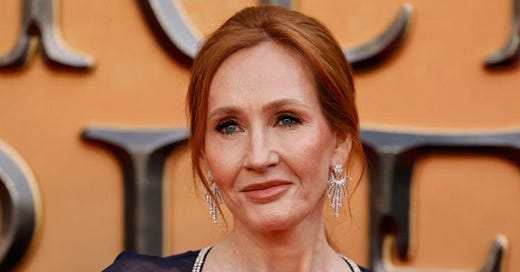JK Rowling’s triumph
She writes about the UK as it is, not as our neo-Victorian elite would like it to be.
Credit: Getty
Greetings, and I hope you are enjoying the weekend,
J.K. Rowling will publish the last of her Strike detective novels later in the month. I will request a review copy, and write about it as soon as the embargo allows.
In the meantime, here is a piece I wrote a few years ago on how she has refused to play the celebrity game. Rowling’s honesty and refusal to trim her gender critical beliefs have brought her many enemies (and admirers too, of course). But crucially her resistance to conformism has protected her writing. Rowling does not deliver twee parables and pious homilies modern culture demands. She writes about the UK as it is, not as our neo-Victorian elite would like it to be. (There’s a paywall but a free trial is on offer to non-subscribers)
Rowling takes the hard road
In Troubled Blood, J.K. Rowling (writing as Robert Galbraith) shows why, for all her fame, she will never be a celebrity.
The hero Cormoran Strike is in a pub listening to his friend Polworth explain the advantages of matrimony.
“There I am trying to get my hole on a Thursday night, heading home alone again, poorer, bored shitless; I thought of the money I’ve spent chasing gash, and the hassle, and whether I want to be watching porn alone at forty, and I thought, this is the whole point. What marriage is for. Am I going to do better than Penny? Am I enjoying talking shit to women in bars? Penny and me get on all right. I could do a hell of a lot worse. She’s not bad looking. I’d have my hole already at home waiting for me, wouldn’t I?”
We are enduring a new era of Victorian respectability. The nineteenth century policed what subjects writers could discuss. The twenty-first century allows them to discuss what they want, then polices how they discuss it. In 99 novels or TV scripts out of 100, a man admitting to “chasing gash” and seeing his wife as a reliable supplier of “hole” would be a carrier of “toxic masculinity”. His revolting words would lead to the inevitable revelation that he was a revolting man who would behave badly and end worse.
Rowling is Victorian only in her Dickensian exuberance. She has produced dozens of characters for her Strike novels, as she did for the Harry Potter stories, and even when the characters are caricatures they ring true. Her powers of imagination and observation, and her remarkable sense of place — when she describes streets I have walked for years, I see them afresh — make the Strike series as much state-of-the-nation novels as detective stories.
If you want to describe your country as it is rather than as the priesthood of the arts want it to be, you must be authentic. To go back to Polworth wagging his finger by the bar: blokes in pubs are more often drunk than toxic. Later in the book, Rowling shows him as a generous man, although, for understandable reasons, his wife gives him a hell of a hard time.
The refusal to play the game, to behave as propriety insists that she must, provokes an unease about Rowling that has turned into outright hatred in some quarters.
To start to understand why, imagine what she could have become when she finished the Harry Potter series in 2007. She was the most famous writer on earth. In all likelihood, she was going to stay that way. For while it is foolish to predict what novels will last, and literary history is full of examples of writers who were feted in their own age and forgotten in the next, I think I can say with certainty that Harry Potter will survive. Indeed, he already has. Rowling first cast her spells in 1997, and they show no signs of weakening.
She might have abandoned her vocation and settled for becoming a national treasure; scrap that, a global treasure. Rowling was beloved. Everyone wanted a piece of her: the media, governments, charities. She might have been an Elton John or Oprah Winfrey figure: a staple of the charity gala circuit. Or become a UN ambassador for this or that like Nicole Kidman, Anne Hathaway and Emma Watson.
All she needed to do was mouth the right words, and smile and frown at the right moments. Instead, she protected her privacy — she has always been wary of the dangers of being overwhelmed by fame — and carried on writing.
Keep reading with a 7-day free trial
Subscribe to Writing from London to keep reading this post and get 7 days of free access to the full post archives.





